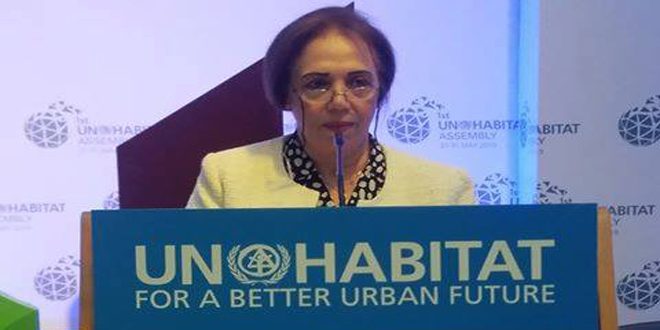The Permanent Representative for Syria to the United Nations Office in Nairobi, Sawsan Alani, said that the terrorist war in Syria led to massive losses and extensive destruction to economic, social and environmental structures, and it also caused huge damage to infrastructure, Syrian heritage and archaeological heritage with historical value.
Delivering a speech during activities of the first session of the United Nations Human Settlements Programme (UN-Habitat) Assembly in Nairobi, Kenya, under the theme, “Innovation for Better Quality of Life in Cities and Communities” on Thursday, Alani said that the unilateral coercive economic measures imposed by some countries and regional entities on Syria since 2011, which are continuing up to now, are illegal and a contradiction of the UN Charter. She noted that the UN resolutions impede their ability to achieve the goals of the 2030 Sustainable Development Plan, as they caused massive losses to the Syrian economy, the country’s capacities, the civil community and the private sector.
She pointed to the disastrous effects of the Israeli entity’s continued occupation of the Syrian Golan in addition to the depletion and wasting of its resources.
She also highlighted the Israeli exercises on the occupied Syrian Golan, which pollute the natural environment and deprive the people of the Syrian Golan of their basic rights and seizing their lands.
Alani indicated that Syria has launched the first national report on sustainable development in 2019 confirming its commitment to sustainable development and its 2030 UN objectives, in line with national priorities and development initiatives, which is a national strategic plan beyond 2030, which aimed at addressing the effects of the crisis and promoting all components of human development.
She called on the UN-Habitat and the other relevant international organizations to take urgent and serious actions to monitor and respond to the negative effects of the unilateral coercive economic measures imposed on Syria and to re-launch the development in order to alleviate the suffering of Syrians, by providing support to implement sustainable development programs and plans, away from the conditions and political considerations of donors.
This article was edited by The Syrian Observer. Responsibility for the information and views set out in this article lies entirely with the author.


